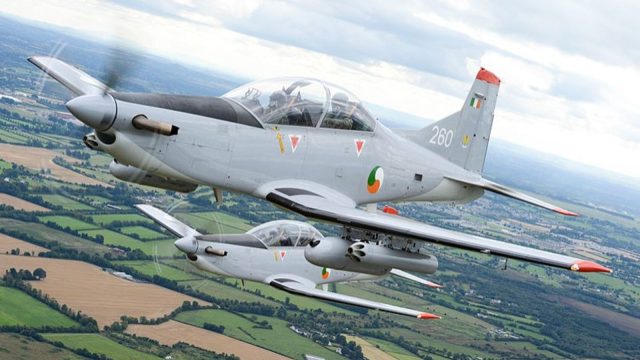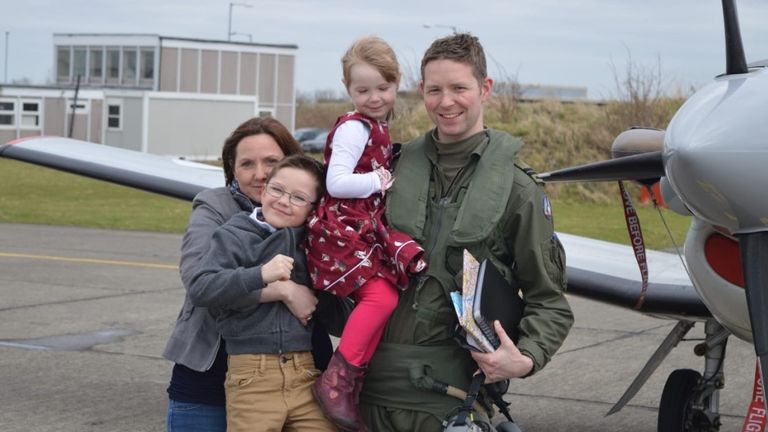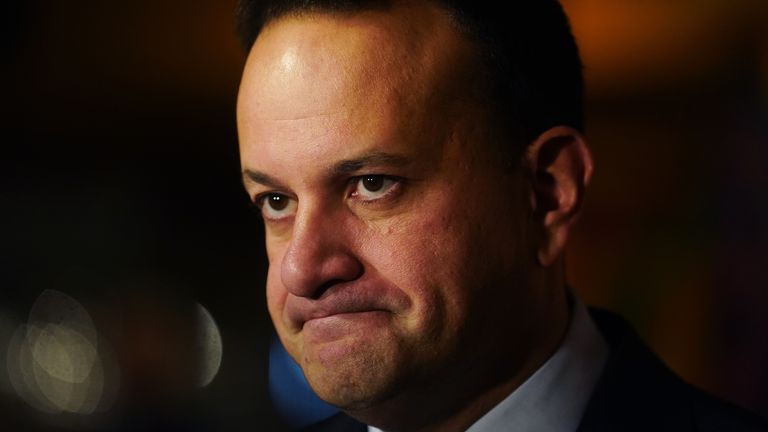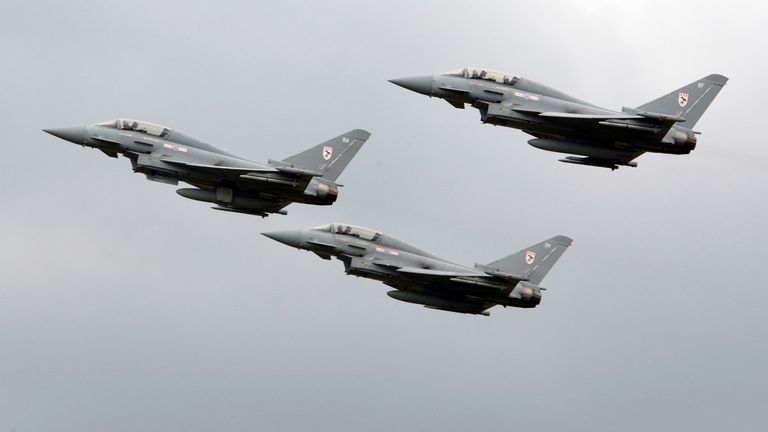The Irish government is being pressed to clarify details of a decades-old secret agreement with the United Kingdom for RAF aircraft to help defend Irish airspace in an emergency.
Sinn Fein is demanding that the government elaborate on the deal to ensure it’s not in breach of Ireland’s cherished neutrality, while a senator is taking a High Court case to force the government to put the details before the Irish parliament.
Although never officially confirmed, it’s believed the Anglo-Irish deal allows for British Typhoon jets, most likely taking off from RAF Lossiemouth in Scotland, to intercept threats in the Irish Flight Information Region (FIR) – the offshore airspace in which Ireland is responsible for civil aviation safety and air traffic control, as well as transiting through Irish sovereign airspace.
The reason? After decades of chronic underinvestment in its military, Ireland lacks a primary radar system capable of detecting, for example, Russian military aircraft once they turn off their transponders – and does not have any aircraft that can fly high or fast enough to interdict such a threat, and identify it visually.
Former Irish Air Corps captain Kevin Phipps, now a commercial airline pilot, flew Ireland’s only combat aircraft, the Swiss-made Pilatus PC-9.
A turboprop airplane, equipped with two machine-guns, it has an effective operating ceiling of just 10,000 feet, well below the altitude where Russian bombers or airliners cruise.
He told Sky News the existence of the RAF deal was an “open secret” among Irish pilots.
“Absolutely”, he says. “We all know the capabilities of the PC-9, and one of the capabilities it doesn’t have is to intercept fast-moving aircraft, such as a Russian “Bear” bomber or a rogue airliner.
“It was a known secret, or a known fact, that we couldn’t intercept something like that.
“I think it’s in their [Britain’s] national interest that if something rogue, for instance a Russian Tu-95 bomber, were to come from the west, it’s in the British national interest to respond to that, knowing that the Irish can’t.”
But even though the Irish Times this week reported the agreement dates back to 1952, the Irish pilots were never officially briefed.
“While it’s an open secret or seems to be,” Captain Phipps said, “we were never shown any documents, we never understood any formal agreements, bar what was outlined in the media at the time, specifically after 9/11, and it was also mentioned periodically in the Irish parliament.”
Official policy is one of no comment
The deal has been alluded to in the Dail [Irish parliament] by former taoisigh [prime ministers] down through the years, but the official policy is one of no comment.
We asked Micheal Martin, Ireland’s tanaiste (deputy prime minister) and defence minister, if he denied the existence of the arrangement with the British government.
He declined to do so, but said, “I believe that story is not accurate… in terms of interdiction”.
When pressed on who would interdict a Russian bomber, given that the Irish Air Corps cannot, Mr Martin replied: “I’ve said what I’ve said, I’m not going into national security any further than that. These are not issues that you publicly identify… it doesn’t make sense, period. It just doesn’t make sense.”
But he also admitted that there “may have been occasions in the past” when RAF aircraft have been in Irish airspace “for different reasons”. He did not elaborate further.
Speaking in the Dail (Irish parliament) this week, the taoiseach (prime minister), Leo Varadkar said that “we do not have an air force of the nature of the United Kingdom, France, Russia or the US and we never will.
“We have to put in arrangements for certain scenarios and we have arrangements for certain scenarios to assure our safety and national security.”
The British government are equally reluctant to comment on any arrangement.
Last November however, the Armed Forces minister James Heappey told the Commons that “RAF jets have deployed into Irish airspace on occasion. It is for the Irish Government to set out their policy on why, when and how”.
In a statement, the RAF told Sky News that their “aircraft only operate in Foreign National Airspace when authorised to do so. We do not offer comment on QRA [Quick Reaction Alert] operational detail”.
But we were also told a bilateral counter-terrorism agreement exists, under which Irish air traffic control can “coordinate” with the RAF to identify any threat as it transitions from Irish to UK airspace.
As that frequently happens in military aviation by intercepting and flying alongside the non-responsive intruder for a visual identification, it’s the closest hint we can get of what might happen under the deal.
Veil of secrecy due to embarrassment of relying on British help
It’s thought the embarrassment of relying on British help, a century after independence, may be a contributory factor to the veil of secrecy thrown over the arrangement by the Irish.
Professor of policing and national security at the University of Central Lancashire, Michael Mulqueen, said “the defence of Irish sovereign territory by the United Kingdom would unquestionably play sensitively in the minds of the Irish electorate, there’s no question about that”.
Prof Mulqueen has interviewed various high-ranking Irish defence officials as part of his academic research, and spoken to them about the secret deal with the UK.
It’s left him “in no doubt that such an arrangement is in place”.
But he says there are “legal difficulties” about how it might actually work, including a serious question over the legality of a British pilot taking lethal action while in Irish-controlled airspace.
Sinn Fein, Ireland’s main opposition party, is demanding answers.
The party maintains that the existence of the Anglo-Irish deal “simply further exposes the abysmal failure of successive Fine Gael and Fianna Fail governments to invest in our defence forces and to ensure that, as an independent, neutral state, we can monitor and defend our airspace and our seas”.
The party has sought more information from the government to clarify the “legal and constitutional matters” arising from the arrangement.
Read more:
RAF boss ready to test ‘limit of the law’ to improve diversity
RAF set to give non-pilot top job for first time in history
Breakthrough as RAF completes first UK flight using 100% sustainable fuel
‘Time has come to bring matter to a head’
There’s also a legal challenge being taken to force the Irish government to put details of the deal into the public domain.
Independent senator Gerard Craughwell – who has served in both the British Army and the Irish Defence Forces during a long career – has taken a case to the Irish High Court on the grounds that the arrangement is unconstitutional.
“The time has come to bring the matter to a head,” said Mr Craughwell, who described the deal as “an impermissible dilution of sovereignty”.
The Irish government maintains that the senator does not have the legal standing to take the case.
So the secrecy continues. A blunt 2022 report from the government-appointed Commission on the Defence Forces concluded that Ireland “has no air defence capability of any significance”. It recommended buying 12 to 24 fighter jets to defend Irish airspace, but that’s still years away from materialising.
Until then, Ireland will continue to rely on its former colonial master to defend itself should a crisis emerge. Just don’t expect to hear anyone in Dublin admit it.













![“It’s hard to say goodbye” – Christian Atsu’s wife composes emotional tribute song for him [Video]](https://ghananewss.com/storage/2023/05/Christian-atsu-and-wife-100x75.jpeg)






